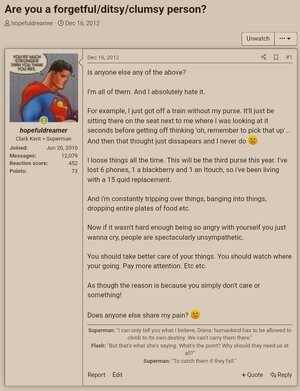- Joined
- Aug 24, 2011
- Messages
- 70,166
- Reaction score
- 39,720
- Points
- 118
A thread for neurodivergence and the neurotypicals who want to know more.
My daughter is a generally happy person as well. Her stress comes primarily from dealing with other people who aren't as accepting and I totally get that. Most of her social life is online where a lot of people feel freer about being mean.

I think I get it more the other way around. Like people think I'm intelligent, then are shocked when I do/say dumb thingsOh yes, I absolutely share your pain.
Do you ever have an intelligent conversation with someone that obviously thought you were an idiot? Their shock is very revealing.
I'm a late diagnosed ADHDer. Also not 'hyper' (at least physically). Got the official diagnosis 3 years ago, ADHD inattentive type.
On the plus side, I'm a therapist now, often working with ND folk, and that shared understanding of the struggles of life pre & post knowledge is very useful.
View attachment 85759
I probably would, too. Or at least be borderline.that's awesome.
I've always said that if i took a test for ADHD, I'd pass.
I have Asperger’s. It’s not something I tell a lot of people, not because I’m ashamed but because some people act badly when they hear it and I can’t be bothered with that.
I have to be honest I like having Asperger’s. I don’t miss what I never had and some of the people I see on the other end who are like, mega extroverts don’t always seem that happy to me
Sorry you have to deal with that, people can be so clueless in their attempts to 'help'.I have the one-two punch of autism and ADHD. Jesus, it's rough. The worst part, symptomatically speaking, is the sensory hell and the inconsistent energy levels. Socially, the worst part is when people treat me like a dog: tons of love and affection, but also people acting like I need to be trained and conditioned, and acting like it's okay to talk about me like I'm not in the room.

Worst part is when the love and affection abruptly stops when you insist on being treated like a person instead of a Paris Hilton purse dog.Sorry you have to deal with that, people can be so clueless in their attempts to 'help'.
Rule 1 for parenting an autistic child: They're always listening. It is easy to assume that when autistic people go non-verbal, they shut the rest of the world out. This is not the case. In my experience, that's when I'm the MOST aware of my surroundings. If your child is in the room and you're talking about them, include them in the conversation. There's not much that's more dehumanizing than people talking about you as if you're not in the room. If it's something that you really can't include your kid in talking about, like complex medical or financial stuff that relates to them, don't have those conversations while the child is anywhere within earshot. But also remember that every year that goes by, your child will be more and more capable of engaging in those conversations. What's okay to talk about behind someone's back when they're 4 isn't okay to talk about behind their back when they're 10 or 15 or an adult.I have a daughter who is going to be 4 that is autistic. We recently started in home and pre-school services for her. The wife and I are trying to learn anything we can in our efforts to parent her better, so if any of yall have anything you know that benefitted you guys when you were younger, let me know! I am essentially willing to try anything that may help her out in the long run
Rule 1 for parenting an autistic child: They're always listening. It is easy to assume that when autistic people go non-verbal, they shut the rest of the world out. This is not the case. In my experience, that's when I'm the MOST aware of my surroundings. If your child is in the room and you're talking about them, include them in the conversation. There's not much that's more dehumanizing than people talking about you as if you're not in the room. If it's something that you really can't include your kid in talking about, like complex medical or financial stuff that relates to them, don't have those conversations while the child is anywhere within earshot. But also remember that every year that goes by, your child will be more and more capable of engaging in those conversations. What's okay to talk about behind someone's back when they're 4 isn't okay to talk about behind their back when they're 10 or 15 or an adult.
